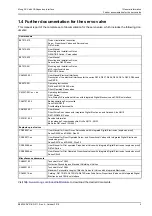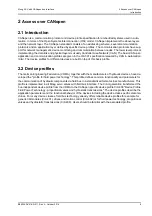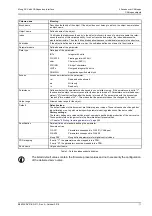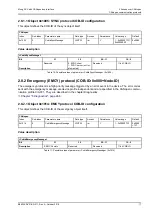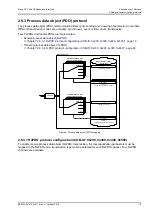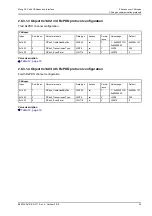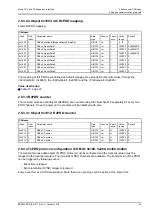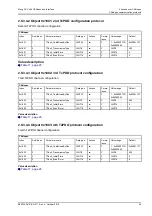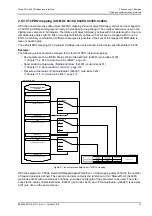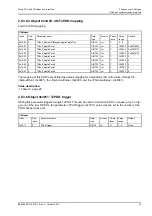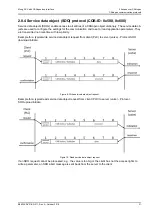
Moog ACV with CANopen bus interface
2 Access over CANopen
CANopen communication protocols
B99224-DV018-D-211, Rev. A, October 2018
16
2.8 CANopen communication protocols
CANopen communication protocols are classified as follows:
• The real-time data are transferred with the process data object (PDO) protocol.
• The configuration parameters are transferred with the service data object (SDO) protocol.
• Special protocols provide application-specific network synchronization (SYNC) protocol, time stamping
and emergency message (EMCY) protocol.
• The network management (NMT) protocol provides services for network initialization, error control and
network status control.
2.8.1 Synchronization (SYNC) protocol (COB-ID: 0x080)
The SYNC protocol is a network wide system trigger generated by one CANopen device in the network. The
SYNC protocol has a very high priority and has no data in order to guarantee a minimum of jitter. The SYNC
protocol is sent by a sync producer and can trigger PDO transmissions in the sync consumer nodes when ac-
tivated in the corresponding PDO transmission types.
Chapter "2.8.3.1.1 Object 0x1400: 1st RxPDO protocol configuration", page 19
Chapter "2.8.3.4.1 Object 0x1800: 1st TxPDO protocol configuration", page 25
Chapter "2.8.3.6 Object 0x3011: TxPDO trigger", page 30
Protocol
COB-ID
Description
SDO objects
used for proto-
col configura-
tion
Reference
Chapter
NMT
0x000
Network Management (NMT)
protocol (Broadcast)
CiA 301
agement (NMT) protocol (COB-ID:
0x000, 0x700)", page 34
NMT
0x000+Node-ID
Network Management (NMT)
protocol
CiA 301
SYNC
0x080
Synchronization (Broadcast)
protocol
0x1005
CiA 301
Chapter "2.8.1 Synchronization
(SYNC) protocol (COB-ID: 0x080)",
page 16
EMCY
0x080+Node-ID
Emergency protocol
0x1014
CiA 301
(EMCY) protocol (COB-ID:
0x080+Node-ID)", page 17
TxPDO
0x180+Node-ID
1st Transmit PDO protocol
0x1800, 0x1A00
CiA 301
Chapter "2.8.3 Process data ob-
RxPDO
0x200+Node-ID
1st Receive PDO protocol
0x1400, 0x1600
CiA 301
TxPDO
0x280+Node-ID
2nd Transmit PDO protocol
0x1801, 0x1A01
CiA 301
RxPDO
0x300+Node-ID
2nd Receive PDO protocol
0x1401, 0x1601
CiA 301
TxPDO
0x380+Node-ID
3rd Transmit PDO protocol
0x1802, 0x1A02
CiA 301
RxPDO
0x400+Node-ID
3rd Receive PDO protocol
0x1402, 0x1602
CiA 301
TxPDO
0x480+Node-ID
4th Transmit PDO protocol
0x1803, 0x1A03
CiA 301
RxPDO
0x500+Node-ID
4th Receive PDO protocol
0x1403, 0x1603
CiA 301
SDO
0x580+Node-ID
Transmit SDO protocol
0x1200
CiA 301
Chapter "2.8.4 Service data ob-
ject (SDO) protocol (COB-ID:
0x580, 0x600)", page 31
SDO
0x600+Node-ID
Receive SDO protocol
0x1200
CiA 301
NMT
0x700+Node-ID
Network Management (NMT)
error control protocol (Bootup,
Node Guarding)
0x100C, 0x100D,
0x1016, 0x1017
CiA 301
agement (NMT) protocol (COB-ID:
0x000, 0x700)", page 34
LSS
0x7E4
Transmit Layer Setting
Services (LSS) protocol
0x1018
CiA 305
Chapter "2.7.1 CAN bit rate and
Node-ID configuration using LSS
services", page 14
LSS
0x7E5
Receive Layer Setting Services
(LSS) protocol
Table 9: CANopen communication objects



